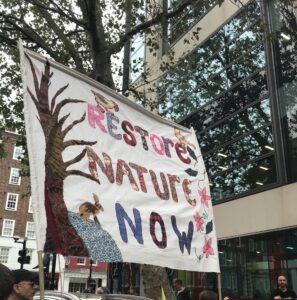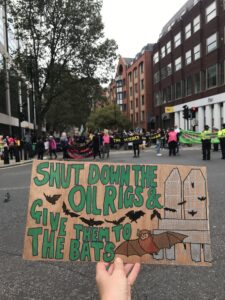As we watch the destruction of the natural world with our eyes pinned open, Abi Andrews joins hedgehog enthusiasts and butterfly conservationists alike at an emergency rally.

A giant black and yellow newt looms lopsidedly over a mass of bodies, a council of animals in papier-mâché — badgers, puffins, otters. White-coated scientists walk between them, holding up placards with dire statistics on wildlife decline. Placards and banners display the logos of over 40 of our environmental conservation organisations: the RSPB, Butterfly Conservation, WWF, the Woodland Trust to name a few. You know it’s getting bad when a protest is mainly birdwatchers and butterfly enthusiasts. They gathered outside the Department for Environment, Food & Rural Affairs (DEFRA) HQ on Thursday, for an emergency rally called for by Springwatch host Chris Packham, in response to the National Trust’s State of Nature Report.
The report apparently paints an abysmal picture of the state of nature in the UK. I haven’t read it — we all have to find ways to hold the crushing anxiety of these times at arm’s length — but I already know I live in one of the most nature-depleted countries in the world. One in six species are on course to become extinct in the UK; that’s a stat I read on one of the placards. Yet we were the birthplace of an array of conservation groups that spread (not always innocently) around the world. It is often said that we are a nation of ‘nature lovers’. There is something macabre in the fact that we have one of the most studied environments in the world, we are replete with data — not to mention a whole literary industry geared towards waxing about ‘nature’ — and yet our natural world is in such an emergency. We have never had more data on the decline; we are overseeing destruction of nature with our eyes pinned open.
This isn’t lost on the conservation crowd. A speaker, maybe it was the man from Butterfly Conservation, described himself as having failed at his vocation. Chris Packham said something similar in a documentary this week, looking regretfully back on a career in zoology in which he has witnessed in close detail the decline of nature on a catastrophic scale.
Packham had called the rally to invite the conservation groups to unite under a demand to ‘Restore Nature Now’. There would be, it was stated on the rally’s website, ‘no paint, no powder, no gluing ourselves’ and this was reiterated by speakers at the event. We will be mild-mannered in our response to the crisis.
I heard anecdotally, off a woman next to me in the crowd, that the RSPB asked their members to attend the rally, but to not wear t-shirts with their logo on. This was apparently in response to being branded ‘political’ recently, and forced to apologise for calling the Conservative government ‘liars’ for backtracking on their environmental pledges. There were people at the rally wearing RSPB branding — presumably staff who had been briefed and could be trusted not to hold up a banner saying anything that might muddy the ‘discourse’. In a statement addressing their ‘liars’ accusation, a representative of the RSPB had said “the nature of public discourse does matter and…we have a role to play in that”.
They needn’t have bothered with the mildness: the Met were there anyway, Police Liaison Officers milling through the crowds, gathering information via friendly chats. Obviously in these times they need to keep a close eye on Patricia who just wants you to build a hedgehog highway and put bacon rinds on the bird table when the winter is harsh. On the ‘discourse’ side of things, The Daily Mail has already described the rally in inflammatory detail.
Perhaps the mildness was orchestrated. Packham told the crowd that they have been entomologists, naturalists, all of the other ‘ists’, but they are now activists, and they cheered. Perhaps this was softly radicalising: demonstrating that it doesn’t matter how mild you are in response to this emergency, they will paint you as extreme as suits them, scapegoating their own extremism. Is it not totalitarian to force a bird protection group to apologise to the government? Is it not weirdly abusive that a crowd of people can’t wear the logo of the group they support with monthly donations, for fear that they might upset the government again? And this is the same government that has just approved an oil field in direct contravention of the Paris Agreement to which they had committed. Petition your local MP to save the green belt, write as many letters as you like — they’re still approving Rosebank. Hopefully the dissonance was not lost on anyone in the crowd — hegemonic capitalism is extremism.

What has got my hackles up here? It’s certainly not the members of the conservation groups. It’s to do with the apparatus, which looms above the individual people at this rally. It’s tied to the fact that the rally was described as ‘unprecedented’, as though the unity of the groups were something to be surprised at, as though before this day, the newt people didn’t care about the plight of the birds, the badger fans couldn’t give a toss about the otters. This has to do with competition for funding and resources, but something else as well. I have come across this working and volunteering for two large wildlife conservation charities, which pummel money into rehabbing and releasing wildlife into a compromised and diminishing habitat. In these groups I found colleagues and fellow volunteers that thought of environmental protesters as ‘extremists’, that thought of calling for changing farm practices as ‘not their business’, and who were often either ambivalent or outright dismissive towards other ‘causes’.
These are drastic, emergent times, and we are stuck within outmoded apparatus. There are no single issues now. You can’t save the hedgehogs without stopping oil and changing farm practices. But we are still having the same arguments on gently accessing ‘hearts and minds’ to communicate nature’s ‘worth’ to an unpersuaded public that we’ve been having since the seventies. It just makes me so sad that the work is so slow and so dissipated. Because something deeper is stymying; it has been called our disenchantment; you might describe it as a hegemonic cultural alienation from the natural world.
It’s a travesty, as the Restore Nasture Now campaign is pointing out, that our main political parties have not thought ‘nature’ important enough to make it into their pledges with concrete and mandatory actions for protection and restoration. But, more upsetting really, is that they don’t think it an ‘issue’ that captivates enough of the public. A nation of nature lovers that just loves some other things a little bit more.
I’m just really fucking sad that we are in the middle of an extinction crisis and this is the level of discourse. At the rally, there are a group of children, they look like siblings, all wearing perfect handmade fox hats. Meanwhile find me crying at the little kids with handmade fox hats, who just love the more-than-human world and have so far been shielded from an alienated culture that wants to disenchant and defang them in the name of capitalist extractivism. Call it what you prefer: empathy for the nonhuman, recognition of its liveliness — ‘animism’ you might dare call it — is normative to children, just plain seeing ‘nature’ not as an ‘issue’ that can win or lose our votes, but as something we cannot extract ourselves from. They don’t need to be persuaded to care about it. For the adults, there is ‘the discourse’ to worry about, there are ‘hearts and minds’ to hand-wring over.
Packham spoke about this hand-wringing, directly, to the humans who make up these organisations, beneath the apparatus. He asked them to remember the love that brought them to conservation, what we might think of as their original enchantment. We are in a battle against the disenchantment raught by extractivist capitalism. The conservation organisations are clearly not saving nature. What might, is their members breaking out from beneath their apparatus, and acting on their love.
*
Abi Andrews is a writer and lapsed wildlife carer. She has published a novel, ‘The Word for Woman is Wilderness’, and is currently working on her second.